16 Card Games for Seniors to Stay Sharp and Connected
By Neal Taparia - Published: 07/22/2025
For seniors, card games offer so much more than simple entertainment. They spark conversation, bring families together, and provide valuable mental exercise that can help keep the mind sharp. And thanks to platforms like Solitaired, enjoying these benefits has never been easier. Solitaired offers a wide selection of card games, from classic favorites to brain-boosting challenges.
Below, we break down some of the best card games for seniors, organized by solo and group play, with games listed from easiest to most challenging. Each entry includes a detailed overview, clear instructions, and a deeper look at why the game offers meaningful benefits.
Senior-Friendly Card Games for Memory, Focus, and Fun
Card games are an effective way to support cognitive health and provide a sense of accomplishment. Whether you’re looking to sharpen memory, boost focus, or simply enjoy meaningful time with others, choosing the right game can make all the difference. The chart below offers a summary of the best games for seniors to help you find the good fit, whether for yourself or a loved one.
| Card game | Number of players | Ease of play | Cognitive engagement | Core executive functions |
|---|---|---|---|---|
| Memory Match (Pairs) | 1 | Very easy | Low | Memory & Recall |
| Clock Solitaire | 1 | Very easy | Low | Pattern Recognition |
| FreeCell | 1 | Easy | Moderate | Planning & Strategy |
| Pyramid Solitaire | 1 | Easy | Moderate | Math & Calculation |
| Solitaire (Klondike) | 1 | Easy | Moderate | Planning & Strategy |
| Spider Solitaire (One Suit) | 1 | Moderate | High | Planning & Strategy |
| Scorpion Solitaire | 1 | Moderate | High | Cognitive Flexibility |
| War | 2 | Very easy | Low | Attention & Focus |
| Go Fish | 2+ | Very easy | Low | Memory & Recall |
| Crazy Eights | 2 to 4 | Easy | Moderate | Decision-Making |
| Gin Rummy | 2 | Moderate | High | Pattern Recognition |
| Canasta | 2 to 6 | Moderate | High | Pattern Recognition |
| Spades | 4 | Moderate | High | Planning & Strategy |
| Euchre | 4 | Moderate | High | Decision-Making |
| Cribbage | 2 to 4 | Challenging | High | Math & Calculation |
| Bridge | 4 | Challenging | Very high | Planning & Strategy |
In the sections that follow, you’ll find a detailed look at each card game, including how to play, why it’s particularly well-suited for seniors, and the specific cognitive benefits it offers. Whether you’re helping a loved one maintain their mental sharpness or planning a game night at a senior center, these deeper insights will help you make a more informed, thoughtful choice tailored to individual needs and preferences.
Solo Play (1-Player Card Games)
1. Memory Match (Pairs)
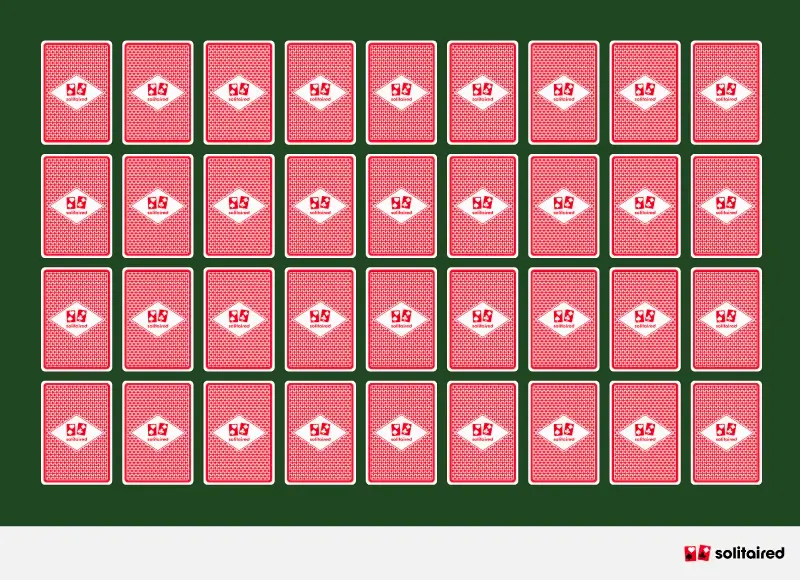
1. Memory Match (Pairs)
Ease of Play:
Very Easy
Cognitive Engagement:
Low
Ease of Play
Very Easy
Cognitive Engagement
Low
Why It's Beneficial
Memory Match actively exercises short-term memory, visual tracking, and concentration. Recalling card positions enhances working memory and strengthens visual-spatial mapping—skills that decline with cognitive aging. The simple gameplay also fosters a sense of accomplishment without overwhelming seniors, making it especially ideal for those with early dementia or mild impairment.
Game Overview
The goal of Memory Match is to find and match all pairs of identical cards by remembering their positions. The deck is shuffled and laid facedown in neat rows, creating a grid. Players flip over two cards at a time, trying to find pairs of matching values (example: two kings or two fours). The challenge is remembering where previously revealed cards are located to find matches efficiently. As pairs are collected, the board visibly empties, providing a clear sense of progress.
Instructions:
- Lay out the cards facedown in rows.
- On each turn, flip two cards.
- If they match, leave them face up; if not, flip them back down.
- Continue until all pairs are matched.
2. Clock Solitaire
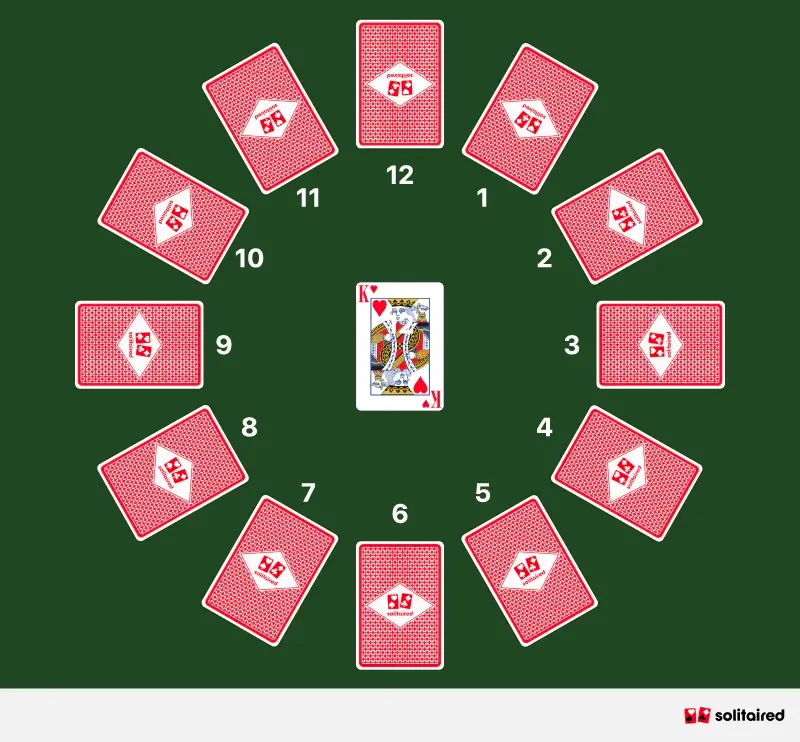
2. Clock Solitaire
Ease of Play:
Very Easy
Cognitive Engagement:
Low
Ease of Play
Very Easy
Cognitive Engagement
Low
Why It's Beneficial
Clock Solitaire provides a highly visual, simple routine that exercises visual processing, symbol recognition, and fine motor coordination. Its familiar clock-face layout adds an intuitive, comforting visual pattern for seniors. Because it’s based on chance rather than strategy, it’s perfect for those seeking light cognitive engagement with no pressure.
Game Overview
The objective of Clock Solitaire is to reveal all the cards in a deck and complete a full “clock” layout without uncovering the final king too early. The cards are arranged like the face of a clock (12 piles in a circle, plus one center pile). Players reveal cards one at a time, placing each card face up under its corresponding clock number. The game continues until either all cards are revealed and correctly placed or the fourth king appears, which ends the game.
Instructions:
- Deal 12 piles (one for each clock number) facedown, and one center pile, with four cards in each pile.
- Turn over the top card of the center pile.
- Place that card face up under the pile corresponding to its value (ace = 1 o’clock, jack = 11 o’clock, queen = 12 o’clock, king = center pile).
- Continue revealing and placing cards according to their values.
- The game ends successfully when all cards are correctly placed or unsuccessfully when the fourth king is revealed.
3. FreeCell
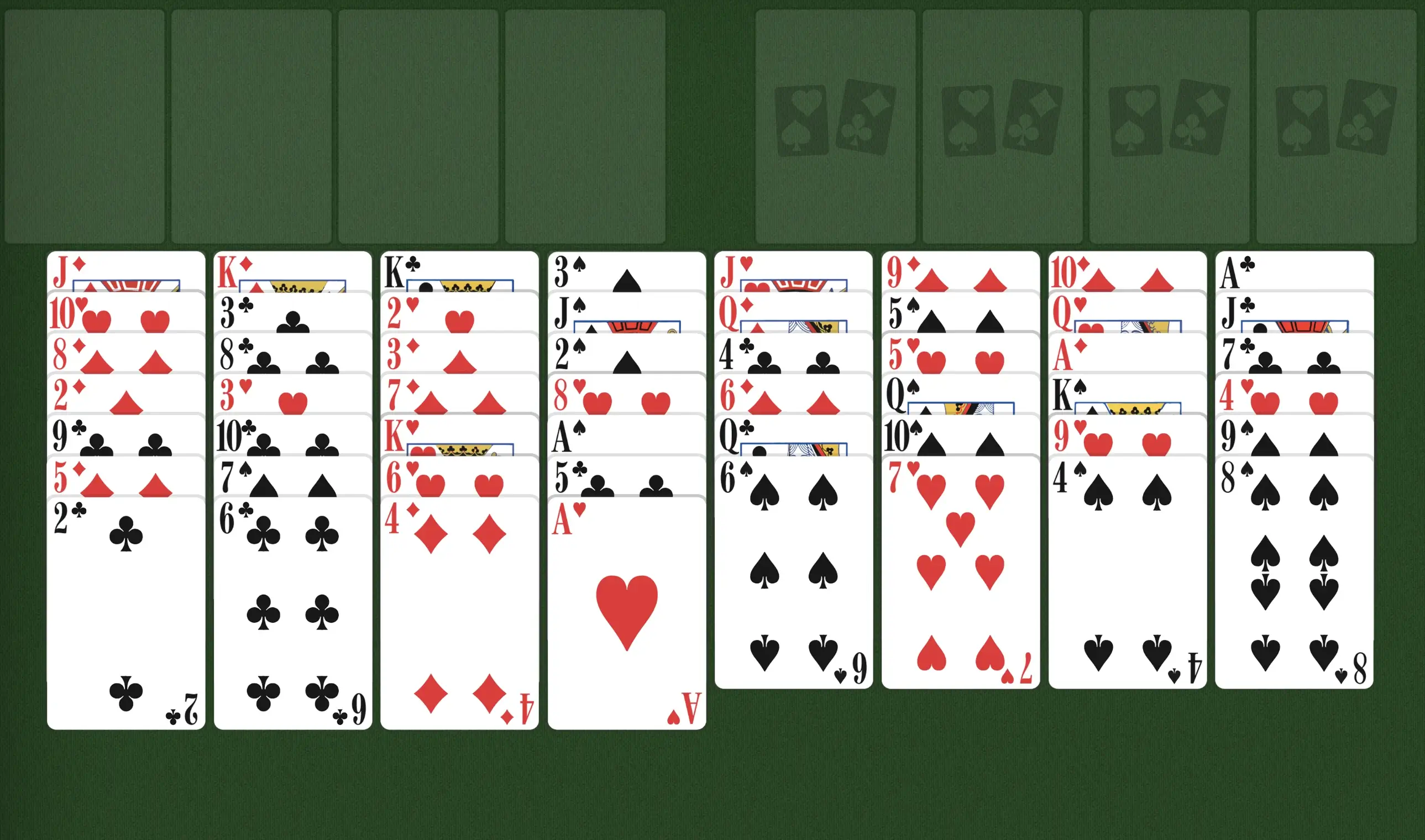
3. FreeCell
Ease of Play:
Easy
Cognitive Engagement:
Moderate
Ease of Play
Easy
Cognitive Engagement
Moderate
Why It's Beneficial
FreeCell is ideal for maintaining executive functioning because it combines logical reasoning, mental flexibility, and delayed gratification. Since most deals are solvable, it encourages persistence while building confidence through solvable challenges.
Game Overview
The objective of FreeCell is to move all 52 cards to the foundation piles in ascending order by suit, using strategy and planning to manage the tableau and four free cells. FreeCell begins with all cards dealt face up, allowing full visibility from the start. The player builds ascending foundation piles by suit, while also organizing cards within the tableau in alternating colors and descending order (similar to Klondike). Four “free cells” serve as temporary storage spaces for cards that are blocking needed moves, offering strategic flexibility when rearranging the tableau.
You can play FreeCell on Solitaired’s website, with features designed to enhance clarity, tracking, and ease of play.
Instructions:
- Move cards to foundations in ascending order by rank. The piles must begin with aces.
- Use free cells to temporarily park cards and open pathways.
- Every move impacts future options, requiring continuous evaluation.
- Win by building complete foundations.
For step-by-step instructions, rules, and a video tutorial, visit Solitaired’s guide on how to play FreeCell.
4. Pyramid Solitaire
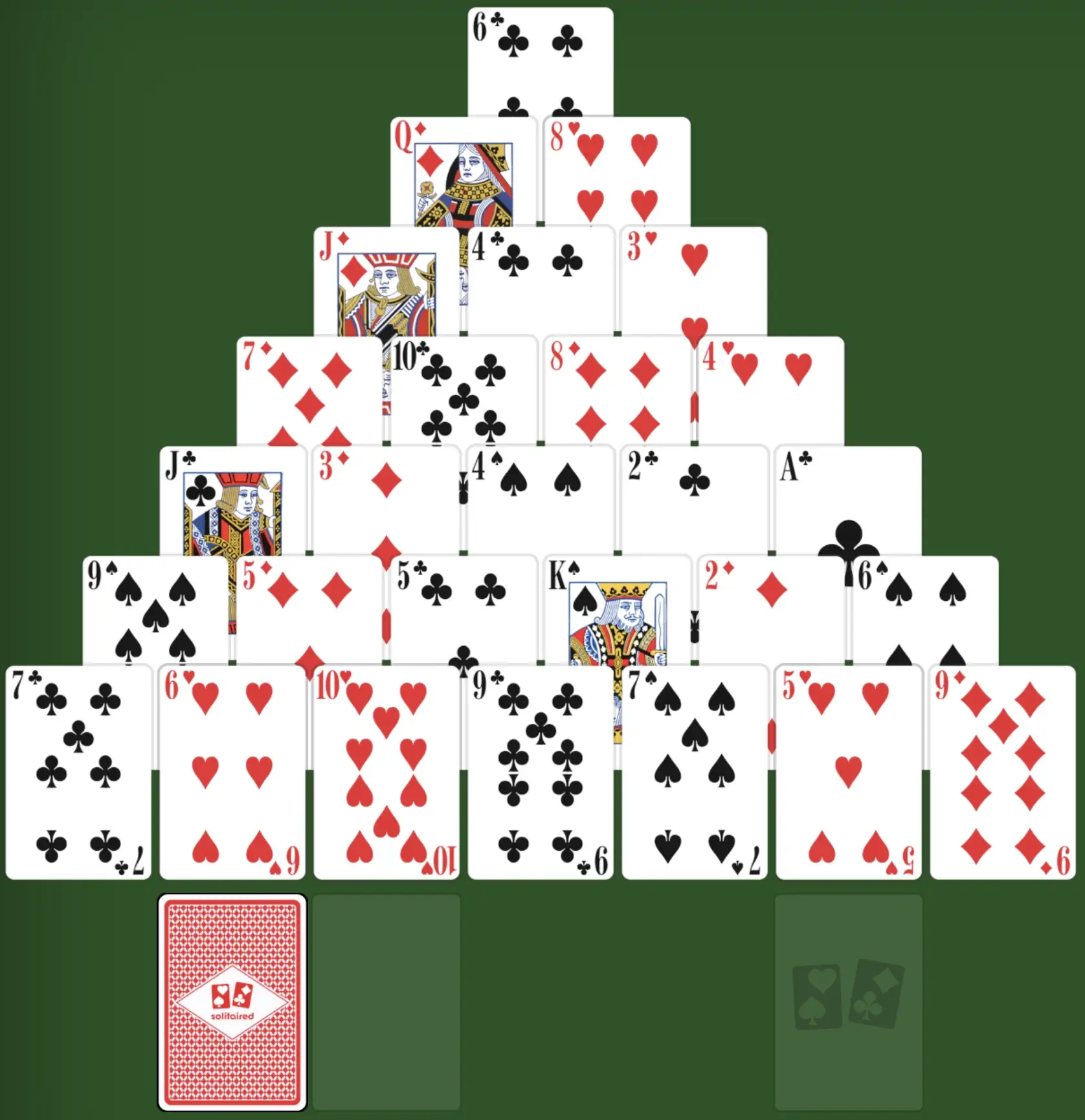
4. Pyramid Solitaire
Ease of Play:
Easy
Cognitive Engagement:
Moderate
Ease of Play
Easy
Cognitive Engagement
Moderate
Why It's Beneficial
Pyramid Solitaire combines visual scanning with simple arithmetic, gently exercising mental calculation and problem-solving. It encourages pattern recognition and rewards steady concentration. The pyramid layout creates visual variety and a strong sense of progress as the structure collapses, which can feel deeply satisfying for seniors.
Game Overview
The objective of Pyramid Solitaire is to remove all the cards from a pyramid-shaped tableau by pairing cards that add up to 13. Cards are dealt face up into a pyramid shape with overlapping rows: one card at the top row, two beneath it, and so on until seven rows are formed. Players pair cards from the tableau or from the tableau and stockpile that total 13 (example: 9 + 4, 10 + 3), with jacks worth 11, queens worth 12, and kings not needing a pair because they’re worth 13. Only available cards—ones with no overlap from the row beneath them—can be paired. As pairs are removed, previously blocked cards become available, gradually breaking down the pyramid.
You can play Pyramid Solitaire directly on Solitaired’s website, where the digital version is optimized for smooth interaction and clear visuals.
Instructions:
- Arrange cards into a pyramid with seven rows.
- Remove available pairs adding to 13; kings (worth 13) are removed individually.
- Draw from the stockpile when no available pairs exist.
- The game is won when all cards are cleared.
For a step-by-step guide with visual examples, check out Solitaired’s complete instructions on how to play Pyramid Solitaire.
5. Solitaire (Klondike)
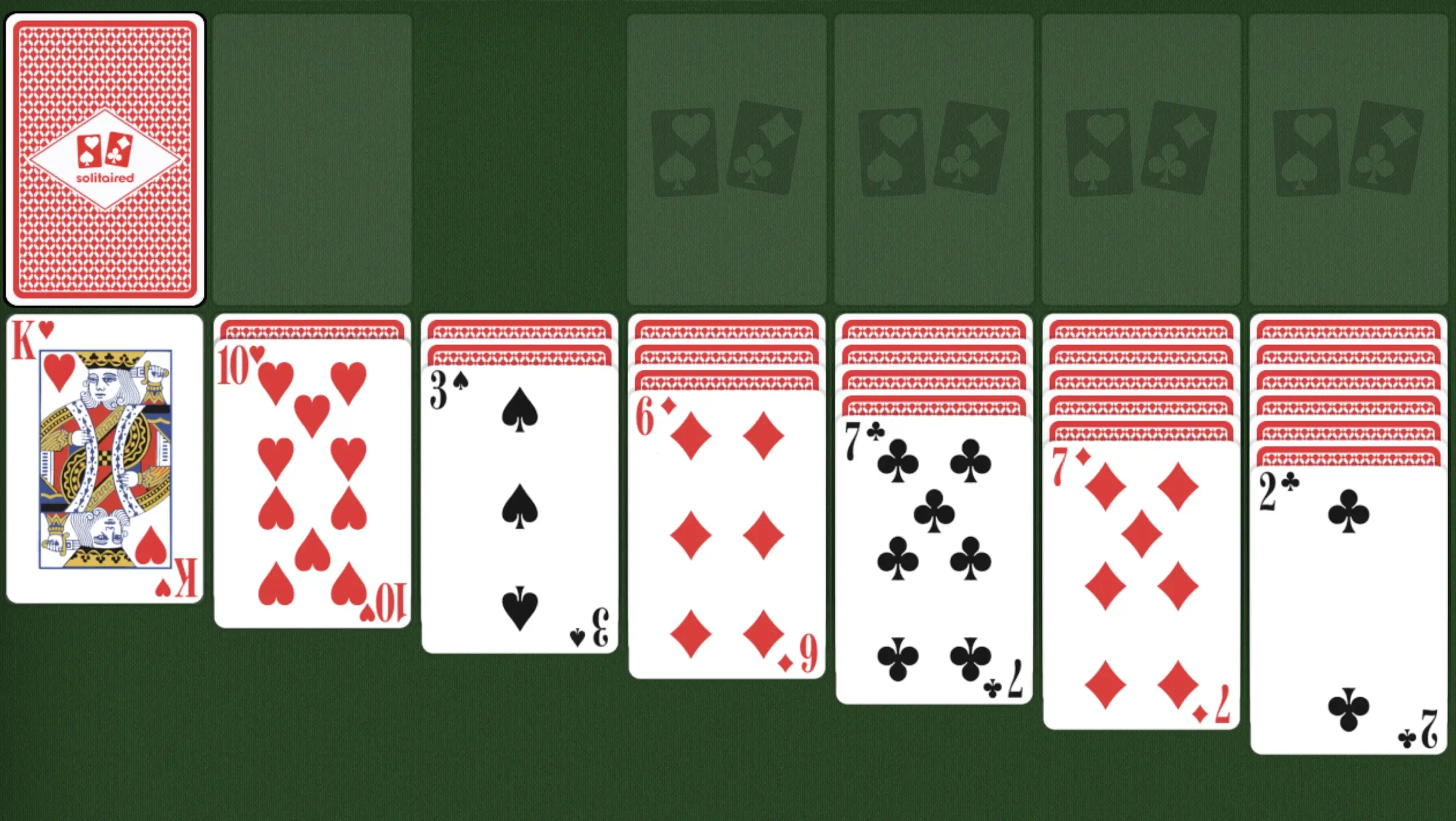
5. Solitaire (Klondike)
Ease of Play:
Easy
Cognitive Engagement:
Moderate
Ease of Play
Easy
Cognitive Engagement
Moderate
Why It's Beneficial
Klondike Solitaire challenges sequencing, foresight, and adaptive planning. Seniors practice multi-step problem-solving while making incremental progress toward clear, achievable goals. Its familiar format creates emotional comfort, particularly for older adults who may have played it for decades.
Game Overview
The goal of Solitaire (Klondike) is to build four foundation piles in ascending order by suit, starting with aces and ending with kings. Seven tableau columns are laid out that increase in length by one card, and only the last card is face up. The remaining cards form a stockpile. Players sequence cards in opposite color (red and black) and in descending order in the tableau to uncover hidden cards, while building foundation piles by suit from ace to king.
You can play Solitaire (Klondike) on Solitaired’s website, featuring intuitive drag-and-drop play, hint options, and unlimited undos.
Instructions:
- Deal the tableau and stockpile.
- Sequence cards in descending order and alternating color.
- Draw from the stockpile when moves are unavailable.
- Win by building all four foundation piles in ascending order.
For a complete explanation of the rules and winning strategies, visit Solitaired’s guide on how to play Solitaire (Klondike).
6. Spider Solitaire (One Suit)
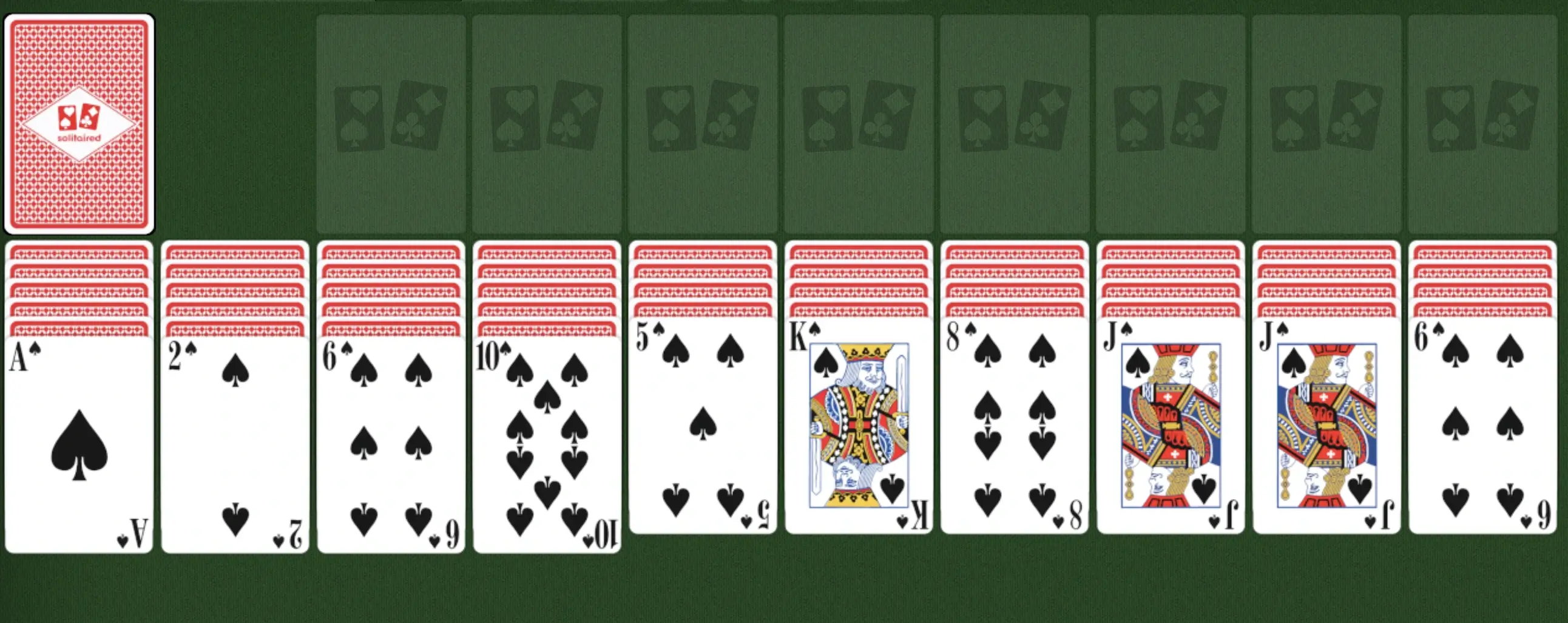
6. Spider Solitaire (One Suit)
Ease of Play:
Moderate
Cognitive Engagement:
High
Ease of Play
Moderate
Cognitive Engagement
High
Why It's Beneficial
Spider Solitaire exercises long-term planning, multi-layered reasoning, and working memory. Seniors must track multiple sequences simultaneously and adjust as new cards are dealt. The game is excellent for seniors seeking sustained, structured cognitive engagement.
Game Overview
The objective of Spider Solitaire (One Suit) is to arrange and remove complete sequences of cards in descending order from king to ace within the tableau. This simplified version uses eight sets of only one suit (typically spades), which is 104 cards. Ten tableau columns are dealt with one face-up card each. Players move cards between columns to build descending sequences. Once a complete sequence from king to ace is formed, it’s removed from play. This version simplifies the rules while retaining the core logic and strategy of full Spider Solitaire.
You can play Spider Solitaire directly on Solitaired’s website, available in 1-, 2-, and 4-suit modes.
Instructions:
- Deal ten columns; move cards between them to build descending sequences.
- Completed suit sequences are automatically cleared.
- When no more moves are available, a new card is dealt to the bottom of each column from the stockpile.
- Win by clearing all cards.
For a full breakdown of rules, strategy tips, and variations, see Solitaired’s guide on how to play Spider Solitaire.
7. Scorpion Solitaire
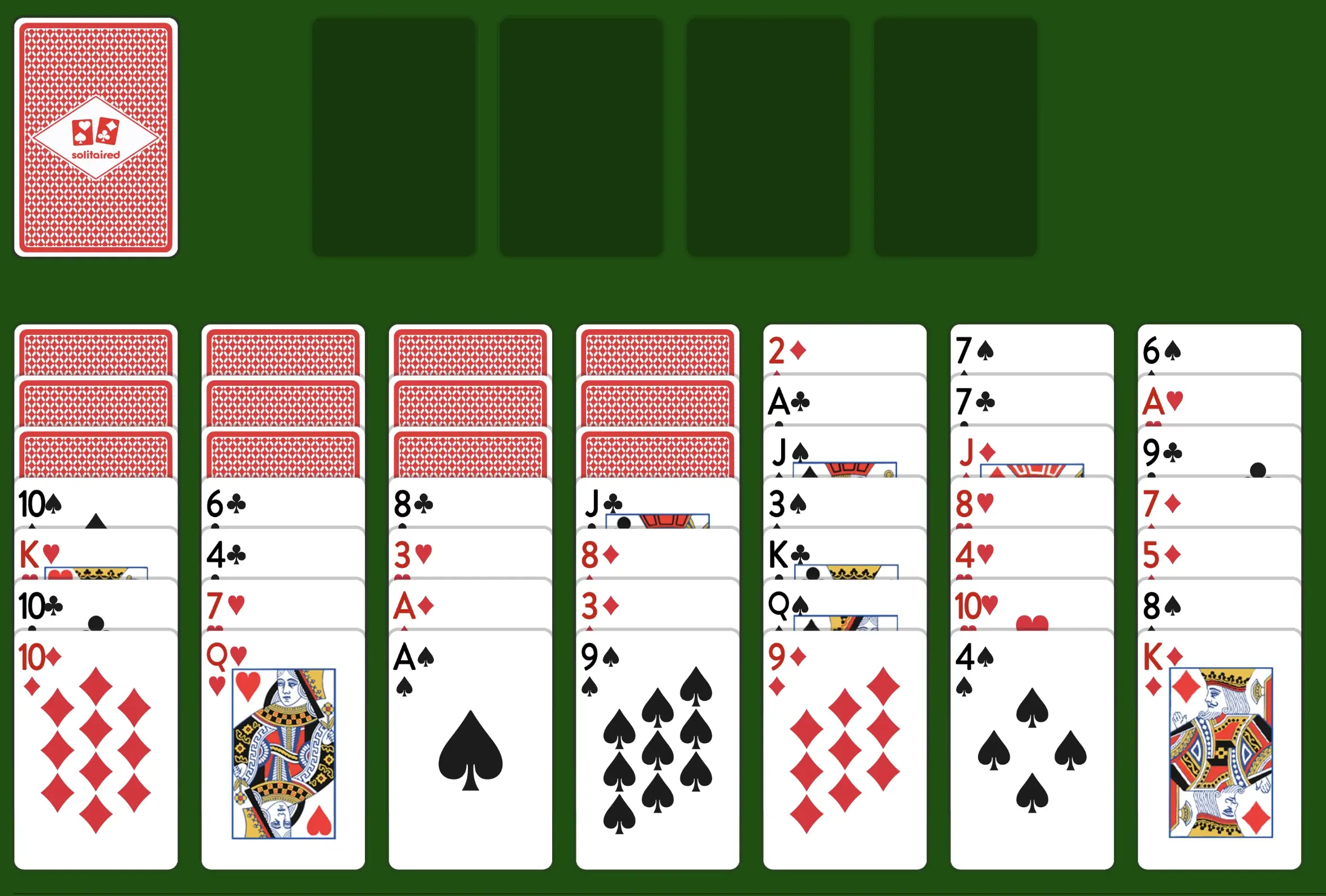
7. Scorpion Solitaire
Ease of Play:
Moderate
Cognitive Engagement:
High
Ease of Play
Moderate
Cognitive Engagement
High
Why It's Beneficial
Scorpion Solitaire stimulates advanced pattern recognition, mental flexibility, and multi-step planning. Because players can move large groups of cards, seniors must constantly adapt and reevaluate their moves, making it ideal for individuals who enjoy deeper cognitive challenges.
Game Overview
The goal of Scorpion Solitaire is to build four complete sequences of cards in descending order from king to ace, all within the same suit. A hybrid of Spider and Yukon Solitaire, this game offers more flexibility in card movement but also more complexity. Like Spider, the goal is to build full descending sequences in-suit from king to ace. But it borrows from Yukon by allowing players to move full or partial stacks of cards regardless of suit, creating more flexibility, but also requiring greater strategic control. The game starts with a partially revealed tableau, and hidden cards must be uncovered and incorporated into ordered stacks to win.
Instructions:
- Deal seven columns of cards, with only the first three columns fully face up.
- Move cards between columns to create descending sequences, ignoring suit initially.
- Rearrange columns as needed to reveal hidden cards.
- Win by creating complete descending suit sequences.
Group Play (2+ Player Card Games)
8. War
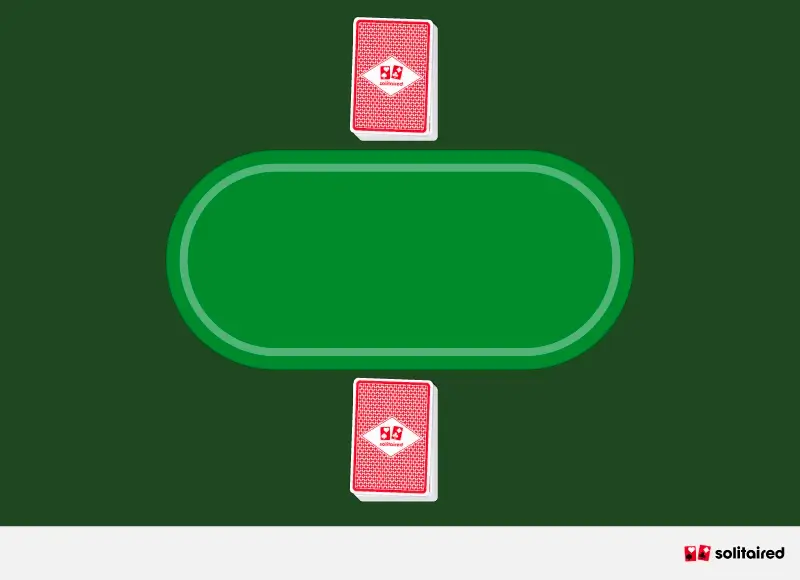
8. War
Ease of Play:
Very Easy
Cognitive Engagement:
Low
Number of Players
2
Ease of Play
Very Easy
Cognitive Engagement
Low
Why It's Beneficial
War requires no decision-making or complex rules, making it highly accessible for seniors. It promotes basic turn-taking, anticipation, and light social interaction. The automatic nature of the game removes performance anxiety while still offering engagement.
Game Overview
The objective of War is to win all the cards in the deck by consistently playing higher-ranking cards than your opponent. It’s a purely chance-based game where each player flips over a card, and the higher card wins the round. In the event of a tie (“war”), players place additional cards facedown before drawing new cards to resolve the tie.
Instructions:
- Divide the deck evenly between players.
- Each player flips over the top card simultaneously.
- The higher card wins both cards.
- Ties are resolved by “war,” placing three cards facedown cards followed by one face-up card, with the highest face-up card breaking the tie.
- The game continues until one player has all the cards.
9. Go Fish
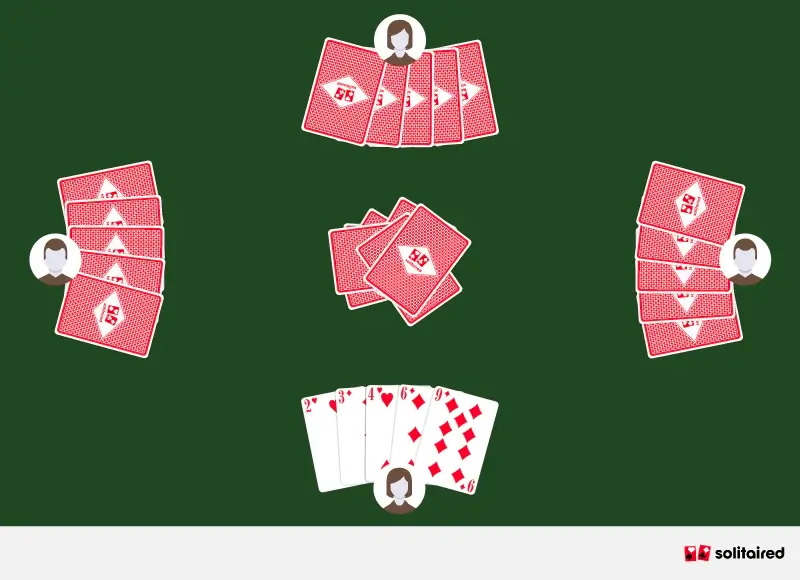
9. Go Fish
Ease of Play:
Very Easy
Cognitive Engagement:
Low
Number of Players
2+
Ease of Play
Very EasyCognitive Engagement
Low
Why It's Beneficial
Go Fish is a classic card game that provides gentle mental stimulation without overwhelming complexity. Players practice short-term memory (recalling which cards have been asked for), social communication, and verbal interaction. The slow pace allows seniors with mild cognitive decline to fully engage while enjoying simple, predictable gameplay.
Game Overview
The goal of Go Fish is to collect the most sets of four matching cards (called “books”) by asking other players for specific ranks. If the opponent has the requested card, they hand it over; if not, the player draws from the deck. As pairs are collected, players lay them face up in front of them, visually tracking progress.
Instructions:
- Deal five to seven cards to each player.
- On your turn, ask any player for a card of a specific rank (example: “Do you have any sevens?”).
- If they have it, they give it to you; if not, you draw from the deck (“Go Fish”).
- Lay down pairs as you collect them.
- The game ends when all pairs are collected; the player with the most pairs wins.
10. Crazy Eights
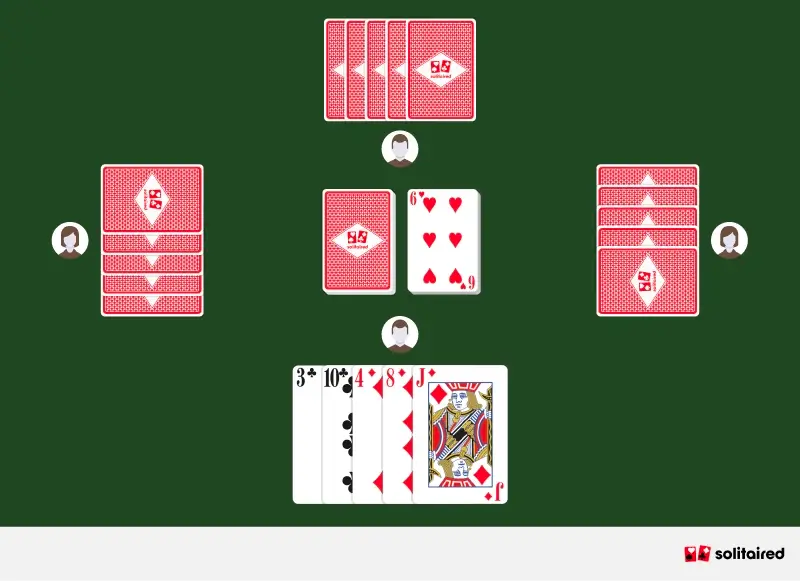
10. Crazy Eights
Ease of Play:
Easy
Cognitive Engagement:
Moderate
Number of Players
2 to 4
Ease of Play
Easy
Cognitive Engagement
Moderate
Why It's Beneficial
: Crazy Eights requires quick decision-making and flexible thinking as players constantly evaluate the best move. Seniors exercise working memory by recalling opponents’ actions while experiencing low-pressure social interaction that’s easy to learn and rewarding to play.Game Overview
The objective of Crazy Eights is to be the first player to discard all your cards by matching the top card on the discard pile by either suit or rank. Eights are wild, allowing players to change suits. The first player to empty their hand wins.Instructions:
- Deal five to seven cards to each player.
- Match the top discard by suit or rank.
- Play an eight to change the suit in play.
- Keep discarding until one player has no cards left.
11. Gin Rummy
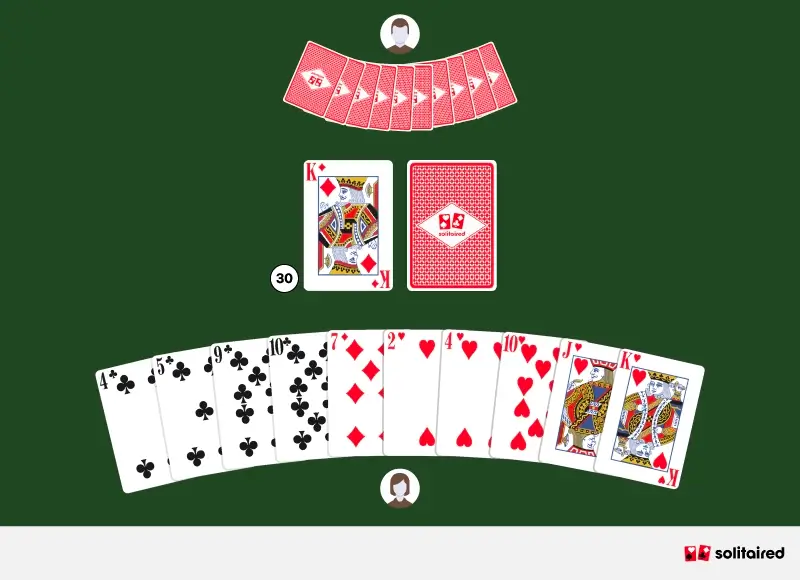
11. Gin Rummy
Ease of Play:
Moderate
Cognitive Engagement:
High
Number of Players
2
Ease of Play
Moderate
Cognitive Engagement
High
Why It's Beneficial
Gin Rummy encourages pattern recognition, tracking multiple options, and anticipating outcomes. Seniors strengthen working memory as they monitor both their hand and opponents’ discards, supporting sustained cognitive engagement while promoting focused social interaction.
Game Overview
The objective of Gin Rummy is to form sets and runs in your hand and be the first to reach the agreed-upon number of points, typically by “going gin” or minimizing unmatched cards. Players build sets (three or four cards of the same rank) and runs (three or more consecutive cards of the same suit), discarding and drawing until one player ends the round by going gin (all ten cards form melds—sets and or runs) or by “knocking” (the player’s unmatched cards total 10 points or fewer).
Instructions:
- Deal 10 cards per player.
- On each turn, draw from the stockpile or discard pile.
- Discard one card after each draw.
- Form melds (sets and runs) to minimize unmatched cards.
- Go gin or knock to end the round and compare scores.
12. Canasta
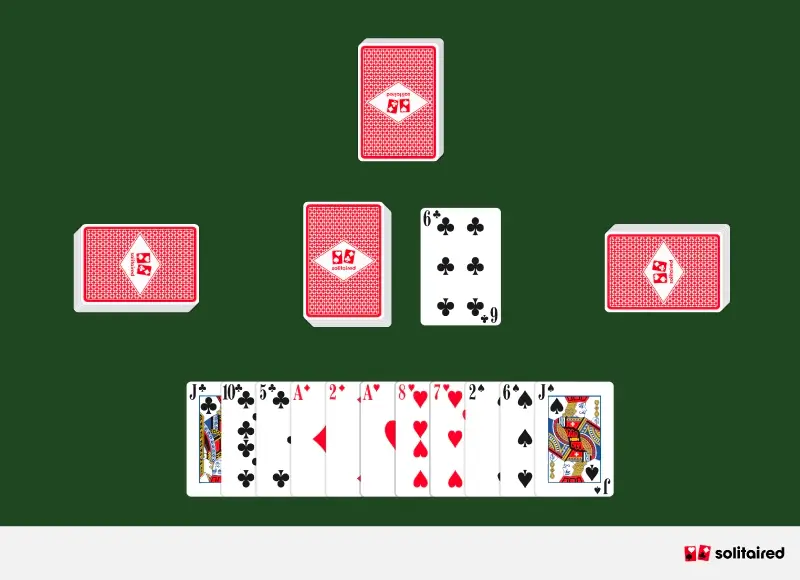
12. Canasta
Ease of Play:
Moderate
Cognitive Engagement:
High
Number of Players
2 to 6 (best with 4, in partnerships)
Ease of Play
Moderate
Cognitive Engagement
High
Why It's Beneficial
Canasta exercises short-term memory, set recognition, and strategic coordination, especially in team play. Seniors benefit from tracking what’s been played, remembering opponent behavior, and collaborating with a partner. The layered scoring system also strengthens mental math and attention to detail, making it a great brain workout and a fun social activity for regular group play.
Game Overview
The goal of Canasta is to score points by forming melds (sets of seven or more cards of the same rank) called “canastas.” It uses two standard decks plus four jokers (108 cards total). Jokers and twos are wild cards that help complete melds. Points are scored for completed canastas and other combinations.
Instructions:
- Deal 11 cards per player.
- Draw and discard on each turn while forming melds (sets of three or more same-rank cards).
- Use wild cards to help complete sets.
- Once a team has at least one canasta, they can go out and end the round.
- Points are scored based on melds, canastas, and remaining cards.
13. Spades
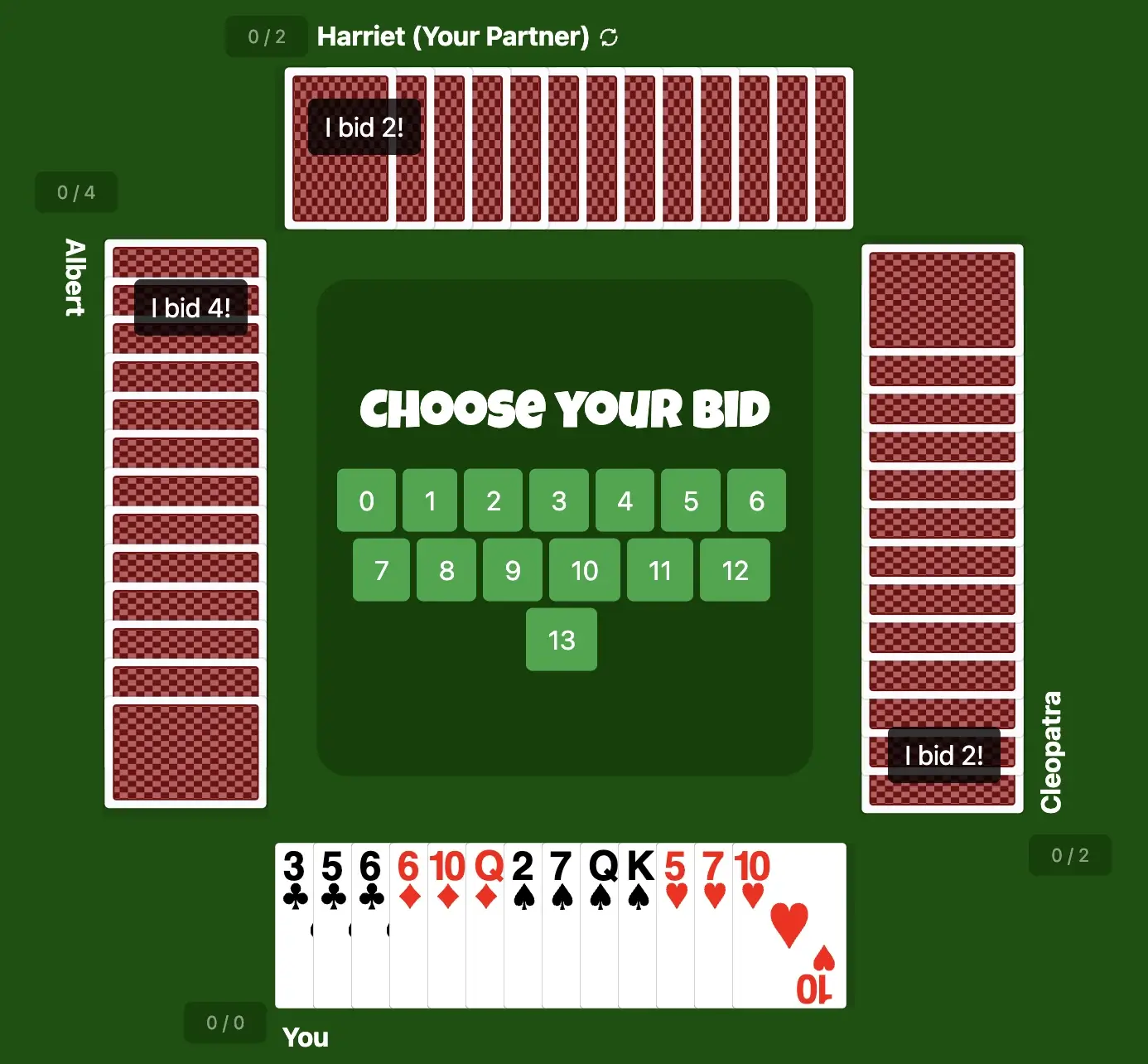
13. Spades
Ease of Play:
Moderate
Cognitive Engagement:
High
Number of Players
4 (partners)
Ease of Play
Moderate
Cognitive Engagement
High
Why It's Beneficial
Spades combines numerical reasoning, strategic planning, and team coordination. Seniors practice predicting outcomes, adapting strategies, and collaborating with a partner, offering rich cognitive and social stimulation for higher-functioning seniors.
Game Overview
The objective of Spades is for teams to accurately bid and win the number of tricks they predict in each round. Spades trump all other suits, adding a layer of strategy to every hand.
You can play Spades on Solitaired’s website, where the game includes clear score tracking and an easy-to-follow interface.
Instructions:
- Each player bids the number of tricks they aim to win.
- Play one card per trick; highest card or spade wins.
- Teams score based on accurate bids.
For complete rules, bidding strategies, and scoring details, visit Solitaired’s guide on how to play Spades.
14. Euchre
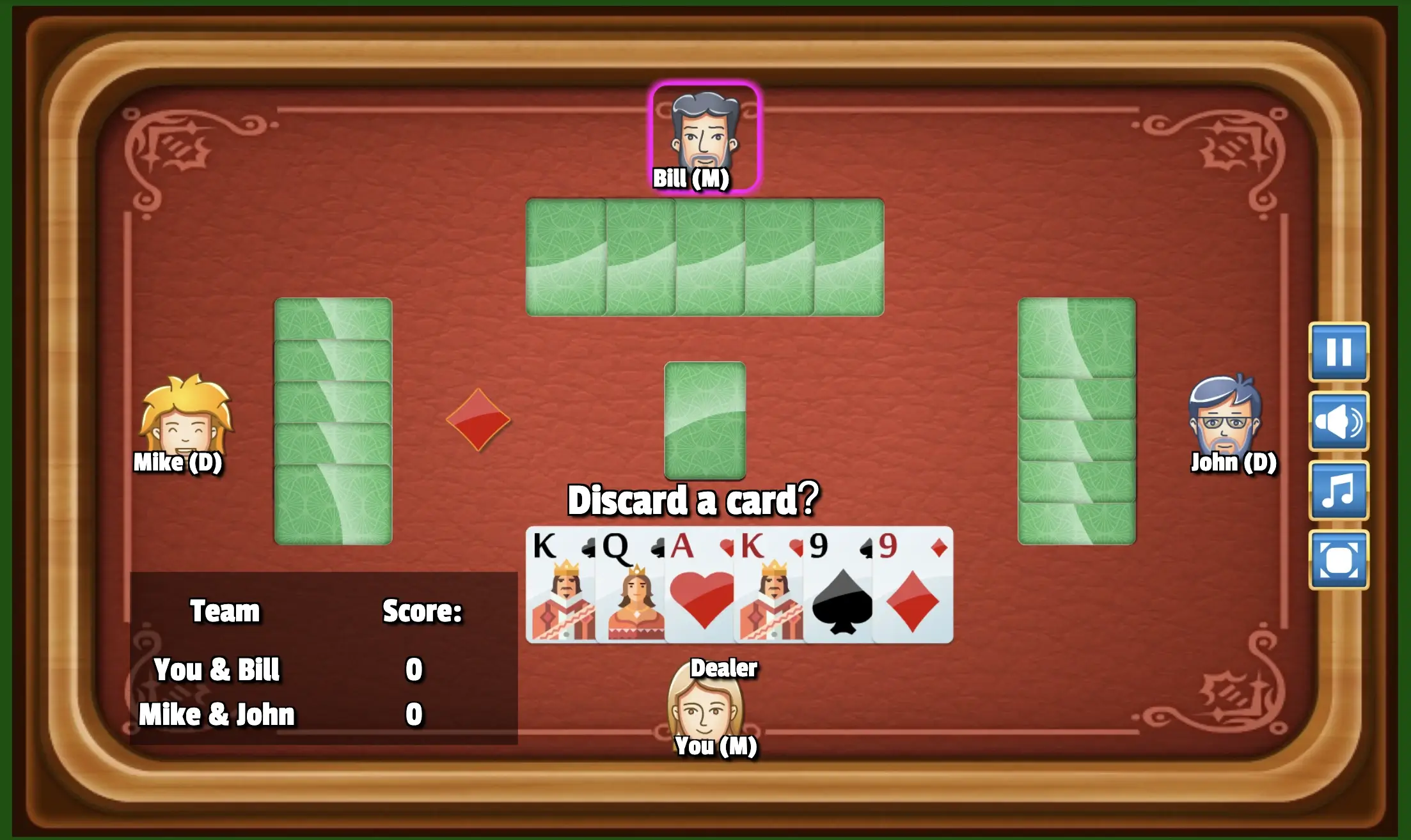
14. Euchre
Ease of Play:
Moderate
Cognitive Engagement:
High
Number of Players
4 (partners)
Ease of Play
Moderate
Cognitive Engagement
High
Why It's Beneficial
Euchre sharpens adaptive thinking, team dynamics, and rapid problem-solving, all of which can help delay the onset of Alzheimer’s. Frequent partner interaction provides meaningful social engagement, while quick rounds allow for satisfying gameplay without long cognitive fatigue.
Game Overview
The goal of Euchre is to win at least three of the five tricks in a round (or all five for a higher score) by working cooperatively with a partner and using trump suit strategy. The trump suit changes each hand, requiring constant tactical adjustment.
Instructions:
- Players take turns to order the trump suit.
- Play five tricks per round.
- Partners work together to win tricks.
- The first team to reach 10 wins the game.
For a full explanation of rules, card values, and advanced tips, check out Solitaired’s guide on how to play Euchre.
15. Cribbage
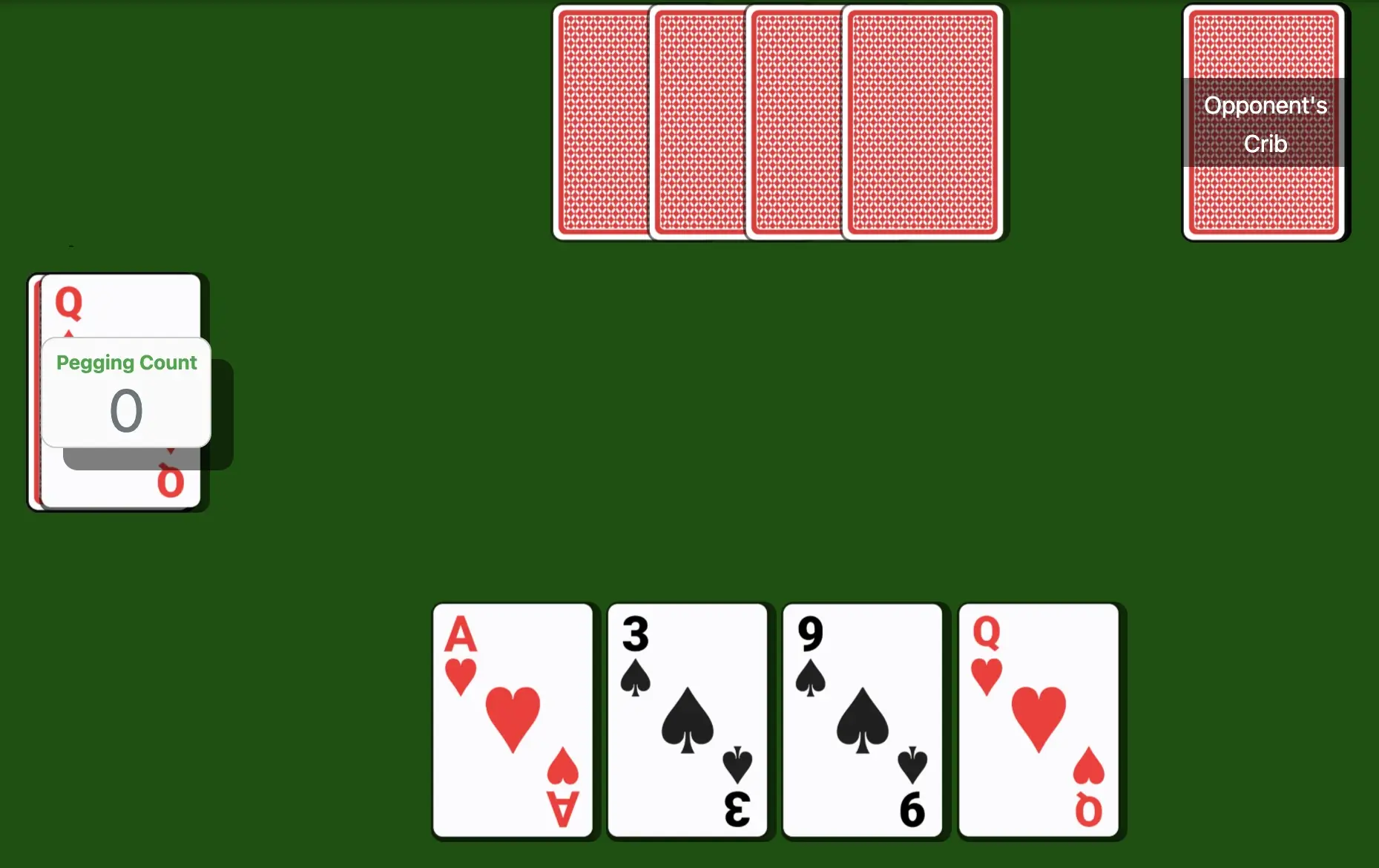
15. Cribbage
Ease of Play:
Challenging
Cognitive Engagement:
High
Number of Players
2 to 4
Ease of Play
Challenging
Cognitive Engagement
High
Why It's Beneficial
Cribbage challenges mental math, memory, and sequencing. Players must calculate point values quickly, remember past plays, and anticipate opponents’ moves. All of which strengthen numerical reasoning, attention span, and strategic thinking.
Game Overview
The goal of Cribbage is to be the first player to reach 121 points by forming strategic combinations of cards (pairs, runs, and 15s). The game has three phases: building the crib (discarding into a bonus hand that the dealer gets to score), pegging play (strategic play for extra points), and the reveal (scoring both hands and the crib). A unique scoring board is used to track points.
You can play Cribbage directly on Solitaired’s website, complete with built-in scoring.
Instructions:
- Each player is dealt six cards and discards two to the “crib” (an extra hand for the dealer).
- Players alternate laying down cards while trying to make scoring combinations.
- After play, both players (and the dealer’s crib) score their hands using combinations.
- First player to 121 points wins.
For complete rules and scoring strategies, visit Solitaired’s guide on how to play Cribbage.
16. Bridge
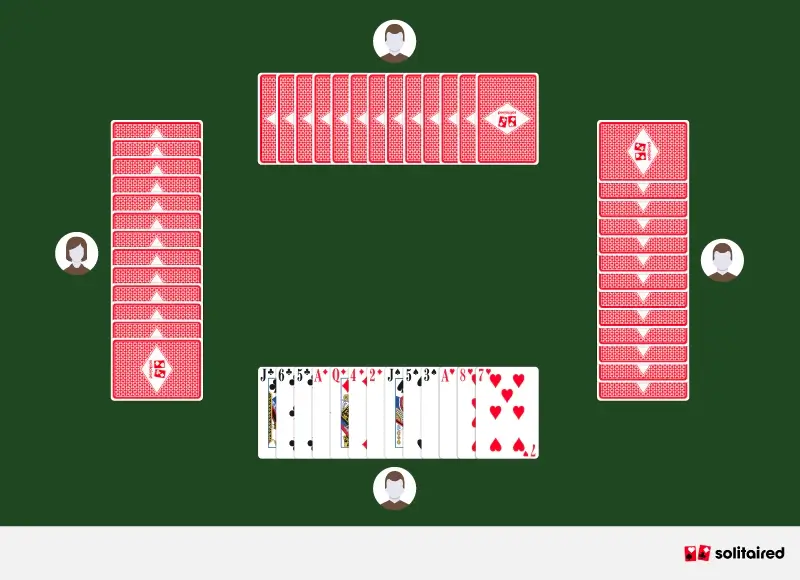
16. Bridge
Ease of Play:
Challenging
Cognitive Engagement:
Very High
Number of Players
4 (partners)
Ease of Play
Challenging
Cognitive Engagement
Very high
Why It's Beneficial
Bridge is a gold standard for cognitive stimulation, exercising memory recall, pattern analysis, mathematical calculation, and strategic communication with a partner. Studies have shown it can help support cognitive resilience and brain plasticity well into advanced age. It offers unparalleled long-term mental engagement and rich social connection.
Game Overview
The objective of Bridge is for a partnership to win the number of tricks they commit to during the bidding phase, using strategic communication, memory, and advanced planning. Teams bid to predict how many tricks they can win and then play accordingly.
Instructions:
- Players bid for the contract (declaring trump suit and number of tricks).
- The partnership winning the bid attempts to meet or exceed their contract.
- Tricks are played one card at a time, and the highest card or trump wins each trick.
- Score is tallied based on successful contract completion.
How Card Games Support Seniors’ Cognitive, Emotional, and Physical Health
The benefits of card games for seniors go far beyond enjoyment. Decades of research shows that playing card games can have a profound and lasting impact on seniors’ wellness, supporting cognitive health, emotional well-being, and even physical coordination. From sharpening memory to reducing feelings of isolation, these games touch multiple areas of wellness that are essential to healthy aging.
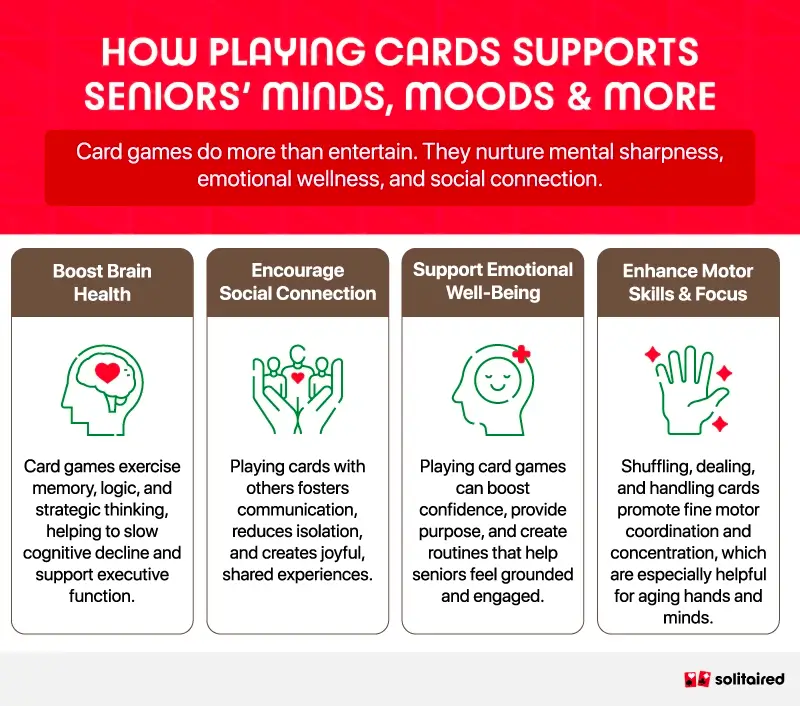
Cognitive Health: Boosting Memory, Focus, and Mental Agility
Card games are more than fun, they’re a workout for the brain. Engaging in card games requires critical thinking, decision-making, and problem-solving skills, which activate multiple brain regions in the process. A study published in the New England Journal of Medicine shows that seniors who regularly participate in mentally stimulating activities like card games have a significantly lower risk of developing dementia.
A systematic review and meta-analysis also found that leisure activities such as playing cards can improve both memory function and cognitive performance. Whether it’s a simple game of Go Fish or a more strategic round of Spades, these activities stimulate brain regions tied to attention, strategic thinking, and memory recall, making them a powerful tool for supporting long-term cognitive health.
Social Interaction: Strengthening Social Bonds and Reducing Isolation
For many older adults, loneliness and social isolation are common challenges. Group card games like Euchre, Bridge, or even a playful round of Crazy Eights offer more than entertainment, they create moments of connection and shared experience. Regular play fosters communication and bonds with loved ones, which research has shown can even support better physical health outcomes, including improved immune function. In this way, card games become a simple yet powerful tool for supporting emotional and physical well-being through connection and community.
Emotional and Physical Well-Being: Supporting Mood, Confidence, and Motor Skills
Beyond cognitive and social benefits, card games can also enhance emotional well-being, offering a sense of purpose, joy, and accomplishment. Winning isn’t everything, but feeling engaged, focused, and successful during play can have a powerful impact on confidence and overall mood.
Card games also support important physical functions, particularly fine motor skills and hand-eye coordination, which are essential for everyday tasks. Games that involve shuffling and dealing a deck of cards offer low-impact but meaningful physical activity, helping to maintain independence through subtle movement that enhances dexterity and fine-motor skills.
NIH-funded research confirms that these seemingly simple activities have real physiological and emotional benefits, making them ideal interventions in assisted living, senior living, and nursing home settings. Whether used as part of a daily routine or a structured group activity, card games offer seniors a way to feel capable, connected, and uplifted.
The Digital Advantage: Why Solitaired Stands Out
Solitaired offers a unique way for seniors to enjoy card games through its highly accessible digital platform. With customizable interfaces, large card displays, and intuitive navigation, Solitaired makes it easy for seniors to continue engaging in the games they love.
Seniors can enjoy classic favorites and new games anytime and anywhere. Solitaired also enables loved ones to stay connected by playing together remotely, helping to reduce social isolation and foster meaningful interactions across distances. For seniors who enjoy friendly competition, Solitaired’s leaderboards let them track progress, challenge friends, and experience the satisfaction of climbing the ranks.
Solitaired provides seniors with activities that:
- Support cognitive function and help delay cognitive decline
- Encourage enriching social interaction
- Adapt to varying abilities for an inclusive and enjoyable gaming experience
A Simple Way for Seniors to Stay Active and Engaged
At the end of the day, card games have a special way of bringing people together while keeping the mind active and engaged. For seniors, they offer more than a pleasant way to pass the time. They provide an opportunity to stay sharp, enjoy meaningful social interaction, and experience a sense of joy and accomplishment. Whether it’s playing a quick round of Solitaire during a quiet moment or sharing laughs over a game of Crazy Eights with family, card games can become a welcome and rewarding part of everyday life.
Solitaired makes it easy to keep that joy going. With its wide range of card games, senior-friendly design, and the ability to play from anywhere, it’s a perfect way for seniors to enjoy their favorite games and maybe even try a few new ones. If you’re looking for an easy way to bring fun, connection, and mental stimulation into your or a loved one’s routine, give Solitaired a try.
About the author

